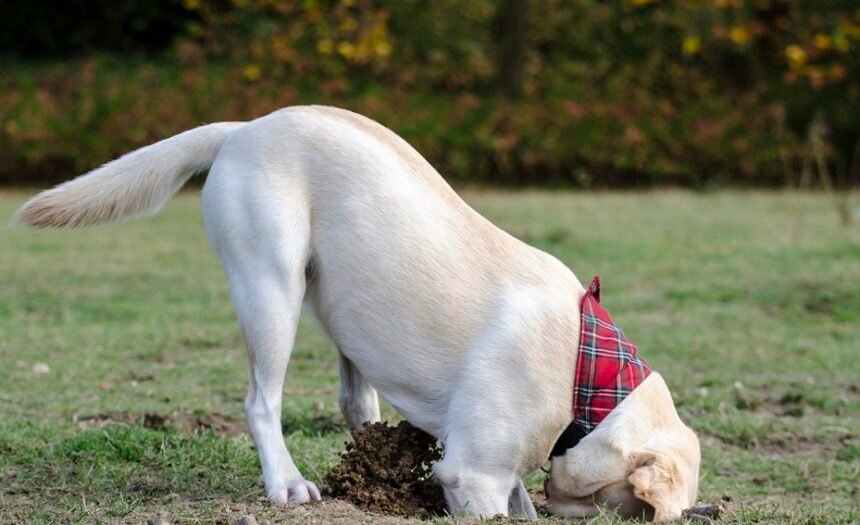Dogs exhibit a fascinating array of behaviors, and among them, digging can often pose a perplexing challenge for dog owners. Whether it’s the sudden appearance of holes in your yard or the relentless determination to unearth hidden treasures, digging behavior can leave you seeking solutions. To successfully curb your dog’s digging tendencies, it’s paramount to delve into the motivations behind this behavior. By identifying the root causes, implementing proactive strategies, and fostering a patient and consistent training approach, you can transform your dog’s digging habits into more constructive activities. This guide provides insights into the reasons dogs dig, along with practical techniques to address and manage this behavior effectively. Through a harmonious blend of understanding and structured guidance, you’ll pave the way for a more content and well-adjusted furry companion.
Understanding Your Dog’s Digging Behavior
- Boredom: One of the primary reasons dogs dig is boredom. Just like humans, dogs need mental and physical engagement to remain content. If your furry friend lacks stimulation, they might resort to digging as a form of entertainment.
- Stress or Anxiety: Dogs, like humans, can experience stress and anxiety. Digging can be a coping mechanism for these emotions. It’s important to identify any triggers that might be causing your dog’s unease.
- Searching for Food or Prey: Dogs have a natural instinct to forage for food, and digging can stem from this primal urge to uncover hidden treasures. This behavior might be more pronounced in breeds with strong hunting instincts.
- Marking Territory: Dogs also dig to mark their territory. The earth-moving action leaves behind a visual and scent-based marker, communicating their presence to other animals.
- Cooling Off on Hot Days: Digging can serve as a way for dogs to find cooler ground during hot weather. It provides them relief from the heat, similar to seeking shade.
Effectively Managing Your Dog’s Digging Behavior
When faced with a dog’s digging behavior, it’s essential to approach the situation with a comprehensive and strategic plan. Digging can stem from various motivations, including boredom, instinctual urges, or emotional distress. To address this behavior and guide your dog toward more suitable activities, consider implementing the following strategies:
- Adequate Exercise and Mental Stimulation: A well-exercised and mentally engaged dog is less prone to dig out of boredom or excess energy. Regular walks, engaging play sessions, interactive toys, and training exercises can channel their energy into positive activities.
- Redirection: When you catch your dog digging, redirect their focus to more appropriate activities. Offer them a toy, initiate a game, or practice obedience commands. This positive redirection helps shift their attention away from digging.
- Designate Digging Zones: Allocate a specific area in your yard where your dog is encouraged to dig. Bury toys or treats in this designated spot to stimulate their natural digging instinct. This way, they have an approved outlet for this behavior.
- Modify the Environment: Make the areas your dog likes to dig in less inviting. Cover these spots with materials like rocks, gravel, or chicken wire to discourage digging. Planting vegetation that dogs find unappealing can also deter them.
- Supervision and Training: Keep a watchful eye on your dog while they’re outdoors. If they begin to dig, use commands like “leave it” or “stop” to interrupt the behavior. Reward them with praise or treats when they comply, reinforcing the desired response.
- Provide Entertainment: Supply your dog with engaging toys that challenge their minds. Puzzle toys that dispense treats or toys designed for mental stimulation can occupy their time and prevent boredom-related digging.
Here are some additional tips:
- Consistency and Positive Reinforcement: Stay consistent in your training efforts. Praise and reward your dog for good behavior, such as using their designated digging area or responding to commands. Positive reinforcement encourages them to repeat desirable actions.
- Seek Professional Guidance: If the digging persists or is driven by anxiety, consulting a professional dog trainer or behaviorist can offer specialized insights and techniques tailored to your dog’s needs.
- Ensure Emotional Well-being: Address any underlying stress or anxiety your dog may be experiencing. Creating a calm environment, practicing relaxation techniques, and considering anxiety-reducing products can aid in minimizing digging triggered by emotional distress.
- Be Patient: Changing behavior takes time. Be patient and persistent in your approach. Avoid punishment, as it can confuse or frighten your dog, potentially exacerbating the digging behavior.
By applying these techniques in a thoughtful and consistent manner, you can effectively address your dog’s digging behavior. The key is to understand the reasons behind their actions and tailor your approach accordingly, all while demonstrating patience and dedication to their well-being. This approach will not only help eliminate the undesired digging behavior but also strengthen the bond between you and your four-legged friend.







